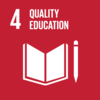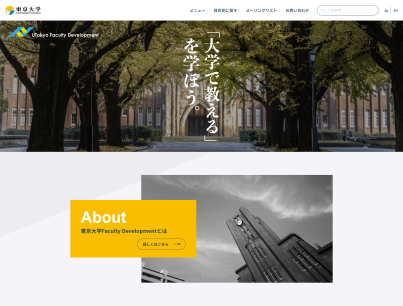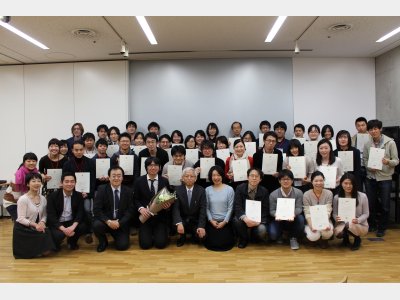The University of Tokyo Future Faculty Program / Interactive Teaching


Kayoko Kurita
Center for Research and Development of Higher Education
Vice Director/Professor
The Center for Research and Development of Higher Education provides two types of programs with the aim of enhancing the teaching skills of graduate students and faculty/staff members: a Japanese program and an online course.
1) The University of Tokyo Future Faculty Program (hereinafter referred to as “UTokyo FFP”)
UTokyo FFP began in AY2013 with the aim of enhancing the teaching skills of graduate students and young faculty/staff members. Designated as a Common Graduate Course, it offers four courses annually, with two in the S and A Semesters respectively, accepting up to 25 participants per class. A total of 954 people have completed the program over the last 20 semesters in 10 years, coming from every graduate school at the University of Tokyo. More than 30 percent of the participants have previously worked as research fellows of the Japan Society for the Promotion of Science. Participants are highly satisfied with the program as training for future faculty members, which also contributes to improving the quality of education conducted at the university, and over 90 percent of the participants responded to a questionnaire stating that they would recommend the program to their friends. Additionally, many of them have been actively working as alumni by getting involved in publishing books and launching new programs. UTokyo FFP was originally offered only to graduate students, but later opened its door to faculty/staff members in AY2016 to also meet their needs. They now account for about 20 percent of current participants.
2) Interactive Teaching
Developed based on the UTokyo FFP, Interactive Teaching is an online course open to people outside the university. It is intended not only for graduate students and faculty members but also for a wider audience involved in teaching, such as teachers in primary/secondary education and people in charge of human resources development at private corporations. More than 26,000 people have taken the course to date. It was previously provided on “gacco”, one of the MOOCs in Japan, but was relocated to Coursera in 2021, where the entire materials were made available in both Japanese and English. A wide range of activities related to the program includes flipped classroom-style workshops of various sizes (from 20 to 300 people), which have been well received both on and off campus, an online course on the JREC-IN Portal website, and the publication of the book “Interactive Teaching”.
1) The University of Tokyo Future Faculty Program (hereinafter referred to as “UTokyo FFP”)
UTokyo FFP began in AY2013 with the aim of enhancing the teaching skills of graduate students and young faculty/staff members. Designated as a Common Graduate Course, it offers four courses annually, with two in the S and A Semesters respectively, accepting up to 25 participants per class. A total of 954 people have completed the program over the last 20 semesters in 10 years, coming from every graduate school at the University of Tokyo. More than 30 percent of the participants have previously worked as research fellows of the Japan Society for the Promotion of Science. Participants are highly satisfied with the program as training for future faculty members, which also contributes to improving the quality of education conducted at the university, and over 90 percent of the participants responded to a questionnaire stating that they would recommend the program to their friends. Additionally, many of them have been actively working as alumni by getting involved in publishing books and launching new programs. UTokyo FFP was originally offered only to graduate students, but later opened its door to faculty/staff members in AY2016 to also meet their needs. They now account for about 20 percent of current participants.
2) Interactive Teaching
Developed based on the UTokyo FFP, Interactive Teaching is an online course open to people outside the university. It is intended not only for graduate students and faculty members but also for a wider audience involved in teaching, such as teachers in primary/secondary education and people in charge of human resources development at private corporations. More than 26,000 people have taken the course to date. It was previously provided on “gacco”, one of the MOOCs in Japan, but was relocated to Coursera in 2021, where the entire materials were made available in both Japanese and English. A wide range of activities related to the program includes flipped classroom-style workshops of various sizes (from 20 to 300 people), which have been well received both on and off campus, an online course on the JREC-IN Portal website, and the publication of the book “Interactive Teaching”.
Related links
Research collaborators
Interactive Teaching was jointly implemented by the University of Tokyo and the Japan Center for Educational Research and Innovation (JCERI).
Related publications
- Kurita, K. (2021). Chapter 7: Daigaku kyōiku kaihatsuron [Teaching development in higher education]. In the Division of Active Learning and Teaching, Komaba Organization for Educational Excellence (KOMEX), The University of Tokyo (Ed.) Tōkyōdaigaku no active learning [Active learning and teaching at the University of Tokyo] (pp. 89-102). University of Tokyo Press.
- Nakamura, N., & Kurita, K. (Eds.). (2021). Interactive teaching jissen-hen 1: Manabi o unagasu jugyōsekkei: class design no sahō to jitsurei [Interactive teaching practice 1: Class design that promotes learning: class design methods and cases]. Kawai Publishing.
- Kurita, K. (2020). Daigakuinsei no tame no kyōiku kenshū no genjō to kadai [Current state and issues of programs in university teaching for graduate students]. The Annual Report of Educational Psychology in Japan, 59, 191-208.
- Kurita, K. (2020). Chapter 3: Daigakuin hakushi katei ni okeru daigaku kyōin yōsei [Training doctoral students to become faculty members]. In the National Institution for Academic Degrees and Quality Enhancement of Higher Education (NIAD-QE) (Ed.) Daigaku ga “chi” no leader ni naru tame no seika jūshi management [Results-oriented management for universities to become the leader of “knowledge”] (pp. 97-117). Gyosei Corporation.
- Kurita, K. (Supervisor), Yoshida, L., & Horiuchi, T. (Eds.). (2017). Hakase ni nattara dō ikiru? 78mei ga kataru career path [How do you live your life after receiving a PhD? Career paths described by 78 people]. Benseisha Publishing.
- Kurita, K., & Japan Center for Educational Research and Innovation (JCERI) (Eds.). (2017). Interactive teaching: Active learning o unagasu jugyō dukuri [Interactive teaching: Class design that promotes active learning]. Kawai Publishing.
- Kurita, K., & Nakamura, N. (2017). Online gata FD program no gakushūkeizokuyōin no bunseki [An analysis of factors in continuous learning with an online FD program]. Proceedings of the 23rd Kyoto University Conference on Higher Education, 74-75.
- Yoshida, L., Kurita, K., & Matsubara, Y. (2017). Pre-FD program jukō no kōka ni kansuru shitsumonshichōsa no shitsutekibunseki [A qualitative analysis of questionnaires on the effects of taking a pre-FD program]. Proceedings of the 23rd Kyoto University Conference on Higher Education, 72-23.
- Yoshida, L., & Kurita, K. (2016). The Development of a Graduate Student Academic Portfolio. Educational Technology Research, 39(1), 111-123.
- Yoshida, L., & Kurita, K. (2016). Evaluation of Structured Academic Portfolio Chart and workshop for reflection on academic work. Procedia Computer Science, 96, 1454-1462.
- -Kurita, K., Ohara, Y., Yamabe, E., & Nakahara, J. (2015). Online FD program “Interactive Teaching” no kaihatsu to hyōka [Development and evaluation of an online FD program “Interactive Teaching”]. Proceedings of the 37th Annual Conference of Japan Association for College and University Education, 228-229.
- Kurita, K., Nakahara, J., & Yoshimi, S. (2014). Tōkyō daigaku future faculty program no igi to tenbō [The significance and prospect of the University of Tokyo Future Faculty Program]. IDE Gendai no Kōtō Kyōiku, 559, 46-50.
- Ambrose, S. A., Bridges, M. W., DiPietro, M., Lovett, M. C., & Norman, M. K. (2014). Daigaku ni okeru “manabi no ba” dukuri: Yoriyoi teaching no tame no nanatsu no genri [How learning works: Seven research-based principles for smart teaching] (K. Kurita, Trans.). Tamagawa University Press. (Original work published 2010)
Contact
- Kayoko Kurita Vice Director/Professor, Center for Research and Development of Higher Education
- Email: utokyo_fd[at]he.u-tokyo.ac.jp
※[at]=@








